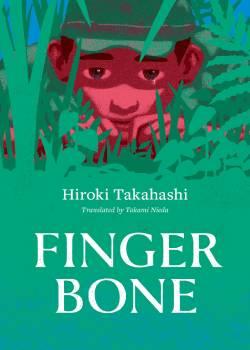Finger Bone

By Takahashi Hiroki
Translated by Nieda Takami
Honford Star (2023)
ISBN-13: 978-1739822590
Review by Laurence Green
1942, Papua New Guinea, and the balance of World War 2 in the East is on the turn. The Japanese have been forced into a fighting retreat, and amidst this chaos, a nameless, wounded member of the Imperial army is left to languish in a field hospital. As those around him succumb one by one, the army doctor cuts off the index finger of their hand, in preparation to send the bone back home to Japan to the deceased’s loved ones. And thus, from this grim momento, Finger Bone finds its name.
Winning the Shincho Prize for New Writers in 2014, before going on to win the esteemed Akutatagawa Prize in 2018, Takahashi Hiroki emerges in this slim novella as an immensely promising talent within Japan’s current literary generation, and is capably translated here by Nieda Takami, who conveys the prose with an elegant matter-of-factness that cuts to the heart of the novel’s unwavering look at the futility of armed conflict.
Finger Bone mines a similar vein to much applauded classics of Japanese war fiction - Ooka Shohei’s Fires on the Plain, in both its book and multiple film incarnations, immediately springs to mind. More broadly, the bleak cynicism and unrelenting realism of Takahashi’s style also recalls All Quiet on the Western Front, so recently brought to the fore of public consciousness again in an Oscar-winning movie treatment. In all these envisionings of war, the authorial lens remains unerring in its ability to lock on to the brutal realism of conflict, both literal and internal. Finger Bone is a war novel, certainly, but it is also a story of an individual man, and the lives of those that pass fleetingly around him in the worst of all possible circumstances. Takahashi’s skill is to present the real with unflinching detail, but to offer just enough of our unnamed narrator’s mind that we feel invested in a character that could have otherwise felt too abstract to latch onto.
Much of this comes down to the tone of the piece - there is a cynicism in the unrelenting bleakness of it all, never overt, but always there just beneath the surface. To question the war would be unthinkable for these mere cogs in the Imperial machine, but even as the novella moves towards its final inevitable conclusion, we are presented odd vignettes of quasi-surreal weirdness that come to deliver the hardest emotional punches. It’s there in the comparison of maggots to pieces of long-grain rice, the almost microscopic anatomical analysis of an eyeball hanging from a corpse - Finger Bone is a dark circus of torments, and certainly not one for the squeamish reader.
For a war novel though, there is surprisingly little actual ‘fighting’. The violence offered is instead of a quieter, more unsettled kind; the Allied soldiers remain largely faceless, at a remove, replaced by the real antagonists of creeping disease, festering wounds and starvation. Our narrator’s comrades depart from life - each death bringing with it an end to short dialogues that remind us that what we see here are only fractions of an individual; culled in war, any vestige of a life beyond the conflict lost beyond what they are able to tell us in the time Takahashi allows them to speak to us. They are merely puppets, both in the hands of the author, and the machinations of the Imperial machine.
Perhaps there is something to be found in the universality of the human condition in the face of war that draws authors to it time and time again. In Finger Bone’s closing pages, and in its riveting cover art, a soldier weeps - and it is indeed impossible not to be moved by the unrelenting bleakness of it all. Tales of the War in the East are countless, but Takahashi’s skill in his take is in stripping back his prose to the very essence of the human condition, cleanly and clinically delivering the descent of one man into mortal oblivion: what remains of life itself - the soul, even - when submersed into the full ugliness and pointlessness of war?

